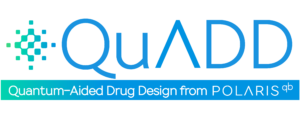Polaris Quantum Biotech (POLARISqb) leverages quantum computing to accelerate drug  discovery, revolutionizing the way that molecular drug design is accomplished. The company released a white paper on the advantages of using the POLARISqb platform Quantum-Aided Drug Design (QuADD) for library generation. An enriched starting library of diverse and drug-like molecules increases the probability of quickly identifying top preclinical drug candidates. The white paper demonstrates how QuADD generates molecules for a custom library and outlines the strengths of QuADD-generated libraries over other methods. In this work, QuADD generates a custom library for Nicotinamide N-Methyltransferase (NNMT), which is a challenging and important target for obesity, insulin-related diseases, and several types of cancer.
discovery, revolutionizing the way that molecular drug design is accomplished. The company released a white paper on the advantages of using the POLARISqb platform Quantum-Aided Drug Design (QuADD) for library generation. An enriched starting library of diverse and drug-like molecules increases the probability of quickly identifying top preclinical drug candidates. The white paper demonstrates how QuADD generates molecules for a custom library and outlines the strengths of QuADD-generated libraries over other methods. In this work, QuADD generates a custom library for Nicotinamide N-Methyltransferase (NNMT), which is a challenging and important target for obesity, insulin-related diseases, and several types of cancer.
QuADD is a Software-as-a-Service platform. With the input of a 3D structure of the protein binding pocket and bound ligand, QuADD generates a multi-billion molecule search space to find lead-like hits that are novel, bioavailable, and synthesizable. This output, which includes candidates for best-in-class, first-in-class, and scaffold-jumping structures, provides an enriched starting library of 1K-10K molecules depending on binding-pocket size for drug discovery research projects. This number of molecules is great enough in size to include a range of options, but small enough that it can be handled with traditional computer-aided drug design programs or high-throughput screening. QuADD includes key parts of our established pipeline that have been discussed in Nature Biopharma Dealmakers, Ars Technica, and Quantum Insider.
The released white paper analyzes the results of QuADD designs for the NNMT target. As the starting point for these QuADD calculations, the POLARISqb chemists selected the human crystallized NNMT protein structure in complex with the bisubstrate inhibitor MS2756 from the Protein Data Bank (PDB code: 6CHH). Results show that QuADD recovers clinically-proven fragments, discriminates between control and decoy molecules, and identifies molecules that are energetically favorable in the pocket, have a rational binding profile, and present drug-like properties. Furthermore, QuADD generates this library in less than three days, which is months faster than the industry standard. The white paper presents strong support that QuADD can facilitate drug discovery by providing enriched small molecule libraries for specific protein pockets, an advantage that lowers the risk and shortens the time to clinical testing.

